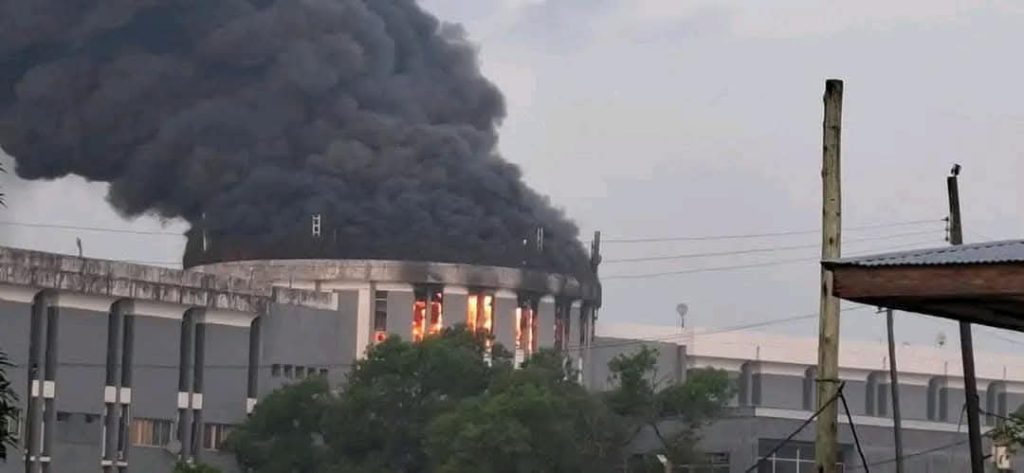The arson attack on the Liberian Capitol Building on December 18, 2024, represents a grave assault on democratic principles and the rule of law. This act of violence, purportedly in protest of Speaker J. Fonati Koffa’s removal, underscores a disturbing trend in Liberia: resorting to violence as a means of addressing political grievances. Such actions undermine the very foundations of a functioning democracy, replacing reasoned discourse and legal processes with destructive chaos. The incident demands a thorough investigation and accountability for those responsible, including those who incited or facilitated the violence. The silence of embattled Speaker Koffa in the face of this blatant disregard for the rule of law raises serious questions about his commitment to the democratic principles he claims to uphold. His supporters’ actions, akin to those of rebels, demonstrate a dangerous willingness to prioritize personal allegiances over the stability and integrity of the nation’s institutions.
While the method of Speaker Koffa’s removal may be subject to debate, resorting to violence as a form of protest is unequivocally unacceptable. The destruction of public property, particularly a symbol of national governance like the Capitol Building, cannot be tolerated under any circumstances. The perpetrators, regardless of their political affiliations, must be brought to justice to send a clear message that such behavior will not be condoned. The government’s response, offering a bounty for information, appears superficial and inadequate. Rather than relying on potentially biased or politically motivated tips, a comprehensive investigation focusing on forensic evidence and witness testimonies is crucial to identify and prosecute those responsible. This incident should serve as a wake-up call for a more robust security apparatus at the Capitol to prevent future attacks and ensure the safety of the nation’s legislative processes.
The recent fire is not an isolated incident but part of a pattern of escalating security breaches at the Capitol Building. Previous incidents, including a fire in the joint chamber the week prior and the unexplained removal of chairs in November, point to a systemic failure in securing this vital government facility. The lack of arrests or even public condemnation of these prior incidents highlights a concerning complacency that likely emboldened the perpetrators of the arson attack. These repeated security lapses demand a thorough review of security protocols and accountability for those responsible for safeguarding the Capitol. The vulnerability of the nation’s legislative center to such intrusions raises serious concerns about the overall security posture of the government and its ability to protect its democratic institutions.
The repeated targeting of the Capitol Building, including break-ins into lawmakers’ offices and reported theft of documents, underscores a troubling disregard for the sanctity of the legislative process. The failure to address these previous security breaches created an environment of impunity that may have contributed to the escalation of violence. The responsibility for these security lapses must be established, and appropriate measures implemented to prevent future incidents. This pattern of unchecked violations demands a comprehensive review of security protocols and a commitment to holding those responsible for maintaining security accountable for their failures. Strengthening security measures and ensuring accountability are essential steps in restoring public trust and protecting the integrity of the legislative process.
The arson attack on the Capitol Building is not merely an act of vandalism but a direct attack on the foundations of Liberian democracy. This violent act, seemingly fueled by political motivations, demonstrates a dangerous disregard for the rule of law and the importance of peaceful political discourse. The incident should serve as a stark reminder of the fragility of democratic institutions and the need for constant vigilance in protecting them. A swift and thorough investigation, leading to the prosecution of those responsible, is crucial to deter future acts of violence and reaffirm the nation’s commitment to democratic principles. Furthermore, this incident highlights the urgent need for national dialogue and reconciliation to address the underlying political tensions that fuel such destructive acts.
The international community, including Liberia’s traditional ally, the United States, has consistently emphasized the importance of upholding democratic principles and respecting the rule of law. The arson attack on the Capitol is a blatant disregard for these principles and a betrayal of the international community’s trust and support. Liberian leaders must demonstrate a genuine commitment to addressing the root causes of political violence and ensuring accountability for those who perpetrate such acts. Failure to do so risks jeopardizing international partnerships and undermining Liberia’s progress towards a stable and democratic future. The incident serves as a critical juncture for Liberia to recommit to the principles of democracy and demonstrate to the international community its resolve to uphold the rule of law and protect its democratic institutions.














